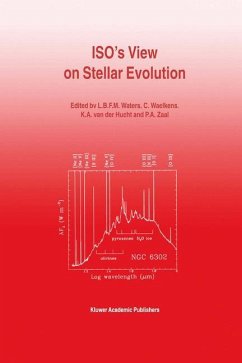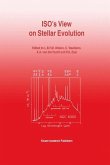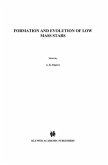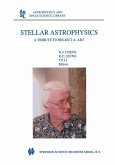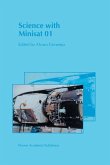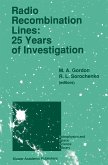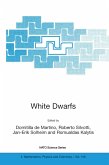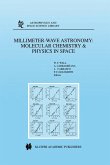Astrophysics and Space Science
Volume 255, 1997/1998 An International Journal of Astronomy, Astrophysics and Space Science
Herausgegeben:Waters, L.B.F.M.; Waelkens, C.; van der Hucht, Karel A.; Zaal, P. A.
Astrophysics and Space Science
Volume 255, 1997/1998 An International Journal of Astronomy, Astrophysics and Space Science
Herausgegeben:Waters, L.B.F.M.; Waelkens, C.; van der Hucht, Karel A.; Zaal, P. A.
- Broschiertes Buch
- Merkliste
- Auf die Merkliste
- Bewerten Bewerten
- Teilen
- Produkt teilen
- Produkterinnerung
- Produkterinnerung
The successful launch on November 17, 1995 of ESA's Infrared Space Observatory (ISO) by means of an Ariane 4 carrier, has set in motion a true revolution in quantitative infrared astronomy. For the first time since the very successful IRAS mission in 1983, the astronomical community has uninterrupted access to the infrared part of the electromagnetic spectrum. The four focal plane instruments on board of ISO ( the camera ISOCAM, the photometerjcamera ISOPHOT, and the short and long wavelength spec trographs ISO-SWS and ISO-LWS), perform very well and live up to the high expectations all of us…mehr
Andere Kunden interessierten sich auch für
![Astrophysics and Space Science Astrophysics and Space Science]() WatersAstrophysics and Space Science166,99 €
WatersAstrophysics and Space Science166,99 €![Formation and Evolution of Low Mass Stars Formation and Evolution of Low Mass Stars]() DupreeFormation and Evolution of Low Mass Stars166,99 €
DupreeFormation and Evolution of Low Mass Stars166,99 €![Stellar Astrophysics Stellar Astrophysics]() Stellar Astrophysics161,99 €
Stellar Astrophysics161,99 €![Science with Minisat 01 Science with Minisat 01]() GimenezScience with Minisat 01125,99 €
GimenezScience with Minisat 01125,99 €![Radio Recombination Lines: 25 Years of Investigation Radio Recombination Lines: 25 Years of Investigation]() M.A. Gordon / R.L. Sorochenko (Hgg.)Radio Recombination Lines: 25 Years of Investigation113,99 €
M.A. Gordon / R.L. Sorochenko (Hgg.)Radio Recombination Lines: 25 Years of Investigation113,99 €![White Dwarfs White Dwarfs]() Domitilla de Martino / Roberto Silvotti / Jan-Erik Solheim / Romualdas Kalytis (Hgg.)White Dwarfs193,99 €
Domitilla de Martino / Roberto Silvotti / Jan-Erik Solheim / Romualdas Kalytis (Hgg.)White Dwarfs193,99 €![Millimeter-Wave Astronomy: Molecular Chemistry & Physics in Space Millimeter-Wave Astronomy: Molecular Chemistry & Physics in Space]() Millimeter-Wave Astronomy: Molecular Chemistry & Physics in Space161,99 €
Millimeter-Wave Astronomy: Molecular Chemistry & Physics in Space161,99 €-
-
-
The successful launch on November 17, 1995 of ESA's Infrared Space Observatory (ISO) by means of an Ariane 4 carrier, has set in motion a true revolution in quantitative infrared astronomy. For the first time since the very successful IRAS mission in 1983, the astronomical community has uninterrupted access to the infrared part of the electromagnetic spectrum. The four focal plane instruments on board of ISO ( the camera ISOCAM, the photometerjcamera ISOPHOT, and the short and long wavelength spec trographs ISO-SWS and ISO-LWS), perform very well and live up to the high expectations all of us had at launch. In the spring of 1996, Thijs de Graauw (principal investigator of the SWS) first suggested the idea to organize a conference dedicated to ISO re sults in the area of stars and circumstellar matter, and coined the title ISO 's View on Stellar Evolution. At the first scientific meeting to highlight some of the early ISO results which was held in May of 1996 at ESA's laboratory ESTEC in Noordwijk, the Netherlands, the conference was announced and a preliminary science organizing committee was formed. The conference was held from July 1 to 4, 1997, in conference centre de Leeuwenhorst, Noord wijkerhout, the Netherlands. The conference was opened by the Director of ESA 's Science Programme, Professor R. Bonnet.
Produktdetails
- Produktdetails
- Verlag: Springer / Springer Netherlands
- Artikelnr. des Verlages: 978-94-010-6132-2
- Softcover reprint of the original 1st ed. 1998
- Seitenzahl: 556
- Erscheinungstermin: 9. August 2012
- Englisch
- Abmessung: 240mm x 160mm x 30mm
- Gewicht: 871g
- ISBN-13: 9789401061322
- ISBN-10: 9401061327
- Artikelnr.: 37477233
- Herstellerkennzeichnung Die Herstellerinformationen sind derzeit nicht verfügbar.
- Verlag: Springer / Springer Netherlands
- Artikelnr. des Verlages: 978-94-010-6132-2
- Softcover reprint of the original 1st ed. 1998
- Seitenzahl: 556
- Erscheinungstermin: 9. August 2012
- Englisch
- Abmessung: 240mm x 160mm x 30mm
- Gewicht: 871g
- ISBN-13: 9789401061322
- ISBN-10: 9401061327
- Artikelnr.: 37477233
- Herstellerkennzeichnung Die Herstellerinformationen sind derzeit nicht verfügbar.
I: Young Stars.- Relation Between Stellar Evolution and Circumstellar Processes (Invited).- Protostars and Protoplanetary Disks (Invited).- ISO Observations of Isolated Herbig AE/BE Stars.- The Intermittently Embedded Herbig AE/BE Stars.- The ISO Spectrum of the Young Star HD 100546.- Far-Infrared Photometry of Circumstellar Matter Around Intermediate Mass Stars.- The ISO Spectrum of the Cloud Core M17-North.- ISO-SWS Observations of Weak Bands of Trace Components of Ices Towards the Young Stellar Object W 33A.- Absorption Features of Ices Toward NGC75381RS1.- PDRS and Shocks in S106 IR and CEP A East.- Search for H2 Emission from Disks Around T Tauri and Herbig AE Stars.- Evolution of Southern Star-Forming Regions.- Dust Disks Around Main Sequence Stars (Invited).- Vega-Like Stars: Grain Removal Replenishment and Recent ISO Observations (Invited).- Dust Around Solar Mass Stars.- Calibration of the Debris Project Isophot Data.- Isophot Observations of VEGA and VEGA-Like Stars.- Isophot S Observations of 3 M Dwarfs.- II: Massive Stars.- Ionized Outflows of Hot Stars (Invited).- Isophot Observations of Early-Type Stars.- HI Infrared Line Formation in Early B-Type Stars.- Transonic Decretion Discs around BE Stars.- ISO's View on Massive Star Evolution: Neon Abundances in Wolf-Rayet Stars (Invited).- ISO SWS Spectroscopy of WR 146 (WC6+0).- ISO Observations of Wolf-Rayet Dust Shells.- Clues to the Evolution of Massive Stars from Their Far-Infrared Environments.- Dust in LBV Nebulae.- Infrared Properties of a Large Ring Around the LBV G79.29+0.46.- ISOCAM Imaging of LBVS.- V 439 CYG as a Late Phase of Stellar Evolution.- Infrared Observations of High-Mass X-Ray Binaries.- ISOCAM Observations of CYG X-3: Search for a Hot Stellar Wind.- First Results from ISO Spectra ofSupernova Remnants Heavily Interacting with the ISM (Invited).- ISO Observations of Freshly Synthesized Supernova Material (Invited).- ISO Observations of Classical Novae (Invited).- ISOPHOT Observations of the RS CVN-Type Star HR 7428.- III: Late Stages Of Stellar Evolution.- Molecules in Stellar Atmospheres (Invited).- SO-SWS Spectral Characterization of Stars.- Molecular Features in ISO-SWS Spectra of O-Rich Long-Period Variables.- Dust Formation and Mass Loss in Evolved Stars (Invited).- Theory of AGB Evolution (Invited).- Dramatic Change in Sakurai' s Object.- Model Atmospheres of AGB Stars: Dynamics, Molecules and Dust.- Synthetic Spectra for Carbon Stars from Dynamical Model Atmospheres.- Episodic Mass Loss and Rapid Lithium Enrichment and Depletion in K Giants.- Molecules of Non-Photospheric Origin in Red Giants and Supergiants Revealed by the ISO SWS.- Infrared Emissions from Metals in Carbon Stars and M Giant.- Tentative Detection of Circumstellar CO2 From the AGB Star R Crateris.- Molecules in AGB Stars Observed with ISO (Invited).- ISO LWS Observations of Cool Evolved Stars and Post-AGB Objects (Invited).- ISO LWS Observations of H2O from R Cas: A Consistent Model for Its Circumstellar Envelope.- Excitation of Far-Infrared Lines of OH and Maser Pumping Efficiency in Circumstellar Envelopes.- ISO-SWS Observations of the Time Variability of Oxygen-Rich Mira Variables.- OSO-SWS Spectra of OH/IR Stars.- Isophot Mapping Observations of Carbon Stars.- Isophot Mapping Observations of a Mira-Type AGB Star R Hya.- Spectroscopic Study of Carbon Stars with the ISO-SWS.- ISO-SWS Spectra of Carbon Stars: Molecular Features and a Comparison with Models.- ISO Observations of Symbiotic Stars.- ISO Spectra of Symbiotic Stars.- Analysis of Infrared Spectra of Carbon StarsObserved by the ISO SWS.- ISO-SWS Observations of Stars with Unusual Iras LRS Characteristics.- AGB Stars in the Magellanic Clouds (Invited).- ISO Spectroscopy of AGB Stars in the Magellanic Clouds.- Evolution and Mass Loss of AGB Stars in the Small Magellanic Cloud.- AGB Stars and Supergiants in the Bar of the LMC.- Obscured AGB Stars in the LMC.- The Red Supergiant IRAS04553-6825 in the LMC.- Extreme Infrared Stars Discovered in Magellanic Cloud Globular Clusters.- Circumstellar Silicate Mineralogy.- Infrared Observations of the Transition from Chaotic to Crystalline Silicates via Thermal Annealing in the Laboratory.- Crystalline Dust Features: A Simple Model.- Formation of AL2O3 Grains and the 13µM Feature in Circumstellar Envelopes of Oxygen-Rich AGB Stars.- Dust Emission From AGB Stars.- Dust and Atomic Gas in Post-AGB Envelopes (Invited).- The 3.4 Microns Absorption Feature in CRL 618.- Hydrodynamical Modelling of the Evolution of Dusty Outflows from AGB-Stars.- ISO's View on AFGL 4106.- ISO SWS Spectroscopy of Proto-Planetary Nebulae.- R. Coronae Borealis Stars, Dust, and Evolution.- Observations of the Dust Around Evolved Stars.- Mass Loss During Proto-Planetary Phase of Evolution.- Spectroscopy and Spectral Energy Distribution of the Peculiar Supergiant IRAS 04296+3429.- Refining the Fundamental Parameters of the 3 Post-AGB Stars: HR 4049, HD 52961 and HD 133656 Using Improved Model Atmospheres.- Planetary Nebulae (Invited).- Chemical Abundances of Planetary Nebulae: A UV to Far-IR Case Study of NGC 6153.- AH's and Crystalline Silicates in Planetary Nebulae.- Investigation of the Small-Scale Temperature and Density Fluctuations in Planetary Nebulae Through the Use of the ISO Data.- ISO-SWS Observations of Planetary Nebulae with [WR] Central Stars.- AuthorIndex.- Object Index.- List of Forthcoming Papers.- The Kluwer LaTeX Style File.
I: Young Stars.- Relation Between Stellar Evolution and Circumstellar Processes (Invited).- Protostars and Protoplanetary Disks (Invited).- ISO Observations of Isolated Herbig AE/BE Stars.- The Intermittently Embedded Herbig AE/BE Stars.- The ISO Spectrum of the Young Star HD 100546.- Far-Infrared Photometry of Circumstellar Matter Around Intermediate Mass Stars.- The ISO Spectrum of the Cloud Core M17-North.- ISO-SWS Observations of Weak Bands of Trace Components of Ices Towards the Young Stellar Object W 33A.- Absorption Features of Ices Toward NGC75381RS1.- PDRS and Shocks in S106 IR and CEP A East.- Search for H2 Emission from Disks Around T Tauri and Herbig AE Stars.- Evolution of Southern Star-Forming Regions.- Dust Disks Around Main Sequence Stars (Invited).- Vega-Like Stars: Grain Removal Replenishment and Recent ISO Observations (Invited).- Dust Around Solar Mass Stars.- Calibration of the Debris Project Isophot Data.- Isophot Observations of VEGA and VEGA-Like Stars.- Isophot S Observations of 3 M Dwarfs.- II: Massive Stars.- Ionized Outflows of Hot Stars (Invited).- Isophot Observations of Early-Type Stars.- HI Infrared Line Formation in Early B-Type Stars.- Transonic Decretion Discs around BE Stars.- ISO's View on Massive Star Evolution: Neon Abundances in Wolf-Rayet Stars (Invited).- ISO SWS Spectroscopy of WR 146 (WC6+0).- ISO Observations of Wolf-Rayet Dust Shells.- Clues to the Evolution of Massive Stars from Their Far-Infrared Environments.- Dust in LBV Nebulae.- Infrared Properties of a Large Ring Around the LBV G79.29+0.46.- ISOCAM Imaging of LBVS.- V 439 CYG as a Late Phase of Stellar Evolution.- Infrared Observations of High-Mass X-Ray Binaries.- ISOCAM Observations of CYG X-3: Search for a Hot Stellar Wind.- First Results from ISO Spectra ofSupernova Remnants Heavily Interacting with the ISM (Invited).- ISO Observations of Freshly Synthesized Supernova Material (Invited).- ISO Observations of Classical Novae (Invited).- ISOPHOT Observations of the RS CVN-Type Star HR 7428.- III: Late Stages Of Stellar Evolution.- Molecules in Stellar Atmospheres (Invited).- SO-SWS Spectral Characterization of Stars.- Molecular Features in ISO-SWS Spectra of O-Rich Long-Period Variables.- Dust Formation and Mass Loss in Evolved Stars (Invited).- Theory of AGB Evolution (Invited).- Dramatic Change in Sakurai' s Object.- Model Atmospheres of AGB Stars: Dynamics, Molecules and Dust.- Synthetic Spectra for Carbon Stars from Dynamical Model Atmospheres.- Episodic Mass Loss and Rapid Lithium Enrichment and Depletion in K Giants.- Molecules of Non-Photospheric Origin in Red Giants and Supergiants Revealed by the ISO SWS.- Infrared Emissions from Metals in Carbon Stars and M Giant.- Tentative Detection of Circumstellar CO2 From the AGB Star R Crateris.- Molecules in AGB Stars Observed with ISO (Invited).- ISO LWS Observations of Cool Evolved Stars and Post-AGB Objects (Invited).- ISO LWS Observations of H2O from R Cas: A Consistent Model for Its Circumstellar Envelope.- Excitation of Far-Infrared Lines of OH and Maser Pumping Efficiency in Circumstellar Envelopes.- ISO-SWS Observations of the Time Variability of Oxygen-Rich Mira Variables.- OSO-SWS Spectra of OH/IR Stars.- Isophot Mapping Observations of Carbon Stars.- Isophot Mapping Observations of a Mira-Type AGB Star R Hya.- Spectroscopic Study of Carbon Stars with the ISO-SWS.- ISO-SWS Spectra of Carbon Stars: Molecular Features and a Comparison with Models.- ISO Observations of Symbiotic Stars.- ISO Spectra of Symbiotic Stars.- Analysis of Infrared Spectra of Carbon StarsObserved by the ISO SWS.- ISO-SWS Observations of Stars with Unusual Iras LRS Characteristics.- AGB Stars in the Magellanic Clouds (Invited).- ISO Spectroscopy of AGB Stars in the Magellanic Clouds.- Evolution and Mass Loss of AGB Stars in the Small Magellanic Cloud.- AGB Stars and Supergiants in the Bar of the LMC.- Obscured AGB Stars in the LMC.- The Red Supergiant IRAS04553-6825 in the LMC.- Extreme Infrared Stars Discovered in Magellanic Cloud Globular Clusters.- Circumstellar Silicate Mineralogy.- Infrared Observations of the Transition from Chaotic to Crystalline Silicates via Thermal Annealing in the Laboratory.- Crystalline Dust Features: A Simple Model.- Formation of AL2O3 Grains and the 13µM Feature in Circumstellar Envelopes of Oxygen-Rich AGB Stars.- Dust Emission From AGB Stars.- Dust and Atomic Gas in Post-AGB Envelopes (Invited).- The 3.4 Microns Absorption Feature in CRL 618.- Hydrodynamical Modelling of the Evolution of Dusty Outflows from AGB-Stars.- ISO's View on AFGL 4106.- ISO SWS Spectroscopy of Proto-Planetary Nebulae.- R. Coronae Borealis Stars, Dust, and Evolution.- Observations of the Dust Around Evolved Stars.- Mass Loss During Proto-Planetary Phase of Evolution.- Spectroscopy and Spectral Energy Distribution of the Peculiar Supergiant IRAS 04296+3429.- Refining the Fundamental Parameters of the 3 Post-AGB Stars: HR 4049, HD 52961 and HD 133656 Using Improved Model Atmospheres.- Planetary Nebulae (Invited).- Chemical Abundances of Planetary Nebulae: A UV to Far-IR Case Study of NGC 6153.- AH's and Crystalline Silicates in Planetary Nebulae.- Investigation of the Small-Scale Temperature and Density Fluctuations in Planetary Nebulae Through the Use of the ISO Data.- ISO-SWS Observations of Planetary Nebulae with [WR] Central Stars.- AuthorIndex.- Object Index.- List of Forthcoming Papers.- The Kluwer LaTeX Style File.

